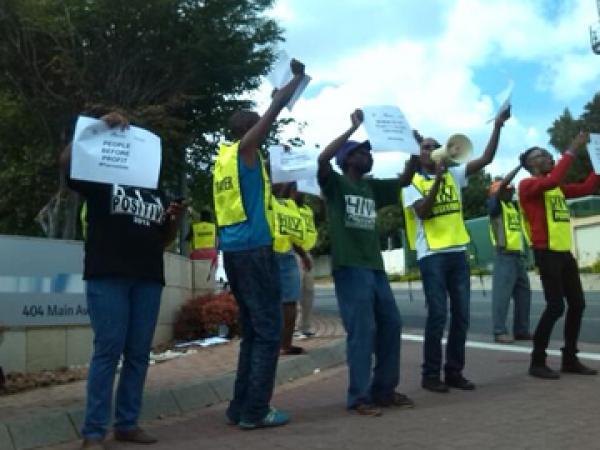The week in political activism

This week we have reports from Treatment Action Campaign (TAC), SECTION27, Medecins Sans Frontieres, SERI, the residents of Slovo Park, Lawyers for Human Rights, Wits Justice Project and the International Organization for Migration (IOM).
Organisations protest against drug company lobby
Yesterday, TAC, SECTION27 and Medecins Sans Frontieres protested outside an executive meeting of Innovative Pharmaceutical Association South Africa (IPASA). The organisations explained why they were protesting:
There has been significant public outrage about a proposal exposed by the Mail & Guardian on 16 January 2014, outlining a R6million deceptive plot to undermine and delay South Africa’s IP Policy reform process. Through incorporating legal safeguards into the existing patent system, these moderate reforms will increase access to affordable life-saving medicines in South Africa. However, the plot explicitly set out to mislead policy-makers and the South African public in order to derail this process. Managing Director of MSD, Micheal Azrak, explicitly endorsed the plot in a leaked email.
Our three organisations strongly support the key features of the draft IP policy and urge the DTI to expedite the process in finalising this process so that the new policy can be implemented as soon as possible.
To find out more go to http://www.tac.org.za.
Slovo Park court action
On 30 January, The Socio-Economic Rights Institute of South Africa (SERI) launched an application in the High Court on behalf of approximately 7,000 people living at the Slovo Park informal settlement. The people want a review of the City of Johannesburg’s failure to take a decision to apply to the Gauteng Provincial Government for funding to upgrade Slovo Park, an omission that they say is in breach of their constitutional rights. They also wish through the court action to compel the city to make the application.
The settlement lacks access to formal services and housing, which the residents have been promised now for 20 years.
To find out more about the case and SERI, a non-profit organisation providing dedicated professional socio-economic rights assistance to individuals, communities and social movements, go to http://www.seri-sa.org.
University in contempt of court after student protests
After last week’s student protests across the country, Lawyers for Human Rights says the Tshwane University of Technology (TUT) is in wilful contempt of a North Gauteng High Court order made on 1 February compelling the university to allow students who had been evicted from their residences to return. Students were evicted late last week amid ongoing violent protests against shortfalls in the National Student Financial Aid Scheme. TUT removed students from their residences without a court order to do so.
Lawyers for Human Rights (LHR) approached the court on an urgent basis and the court found that the evictions were unlawful and unconstitutional and issued a punitive cost order against the university.
LHR explains that in the light of the deliberate ongoing contempt displayed by TUT, it will now approach the North Gauteng High Court for a contempt order against the executive management of TUT and an order directing the sheriff of the High Court to enforce the order and ensure compliance.
See more at http://www.lhr.org.za
Take a listen - #iamamigrant
The International Organizaion for Migration (IOM) has released a song on migration, #iamamigrant, in South Africa. Pledging their time and craftsmanship were Kabomo, Masechaba Lekalake, Khabonina, Lection, AB Crazy, Jackie Carpede, Simphiwe Gwegwe, Mabongi, and Monde Msuthwana, and equally talented up-and-coming artists such as Lady X, Tribute, Moonga, and Shatti. The song is aimed at raising awareness about migration. So take a listen to I am a migrant.
Take a look - Know your rights
The Wits Justice Project has just released a booklet: Know your rights: A simple guide to the South African criminal procedure in English and Azi Amalungelo Akho: Umhlahlandlela olula wenkambiso yokubhekana nobelelesi eningizimu Afrika in Zulu. The guide navigates the reader through the criminal justice system from the point of arrest to appearing in court – and everything in between. The booklet is easy to read so that citizens have a better understanding of their rights.
You can read the booklet online here.
Support independent journalism
Donate using Payfast

Don't miss out on the latest news
We respect your privacy, and promise we won't spam you.

This article is licensed under a Creative Commons Attribution-NoDerivatives 4.0 International License.
